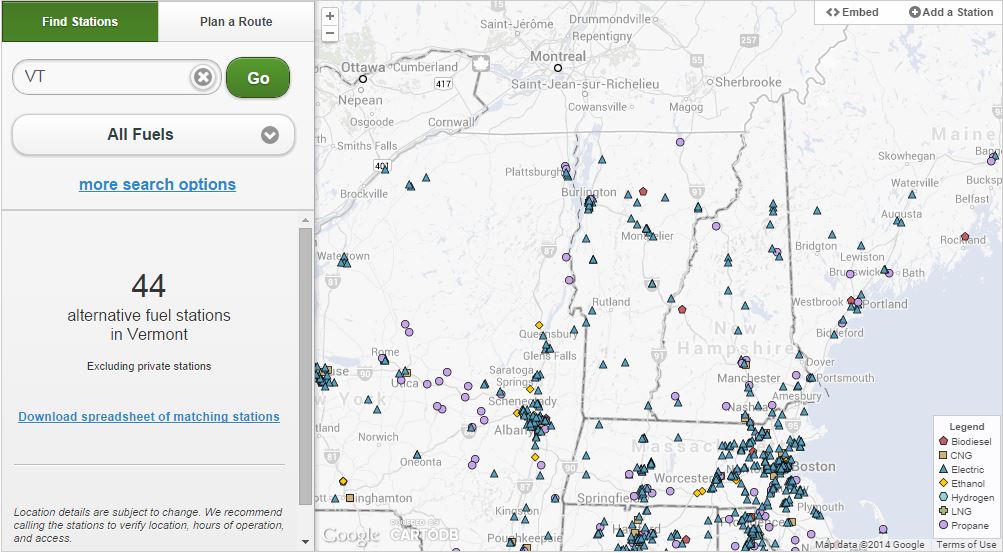HackVT 2014 Transportation Datasets

The 2014 HackVT contest is just around the corner and we are thrilled this year's theme is creating a brighter energy future for the State of Vermont.
Transportation is a critical part of meeting our total energy goals of reducing energy use and shifting to 90% renewable sources by 2050.
We have a few thoughts on data the HackVT crew might find useful in their efforts:
1. Electric Vehicle Registrations
Electric vehicles (EVs) can be powered by a variety of renewable energy sources, ranging from Solar PV, hydro, Cow Power, and more. As of July 2014, Vermont was home to 700 plug-in passenger cars including both all electric models and plug-in hybrids which run on both gasoline and electricity stored in a battery. The data file below includes information on the type and location of Vermont's EVs based on vehicle registration data prepared by the Vermont Department of Motor Vehicles and Agency of Natural Resources Department of Environmental Conservation.
July 2014 Vermont EV Registration Data (CSV Format)
Data Fields
- EV-Type - PHEV (Plug-in Hybrid Electric Vehicle) or AEV (All Electric Vehicle)
- Make - Vehicle manufacturer (e.g. CHEVROLET, FORD, NISSAN, etc)
- Model - Vehicle model (e.g. Volt, Leaf, etc)
- ModelYear - Model year of vehicle (e.g. 2014)
- MailingAddress-ZIP - Zip code of vehicle registration mailing address (a few vehicles registered in Vermont have out of state mailing addresses).
2. Public EV Charging Stations
The US Department of Energy maintains the Alternate Fuel Data Center Station Locator database with information on a variety of public facilities for fueling/charging vehicles. There is API access available through the developers at the National Renewable Energy Lab (NREL). This is the same data we use to display our map of public EV charging stations in Vermont.
US DOE AFDC Station Locator
http://www.afdc.energy.gov/locator/stations/
NREL Developer APIs
http://developer.nrel.gov/docs/transportation/alt-fuel-stations-v1/
3. Google Transit Feed for CCTA / GMTA
We think EVs are a great way to reduce energy use and shift to renewable energy, but if we all got out of our cars onto public transportation that would certainly go a long way toward meeting our energy goals. There are many challenges to making that happen, but we need to continue investing in all kinds of efficient transportation options (bus, walk, bike, car sharing, better land use planning, etc) to get there. One problem many people encounter with taking the bus is confusion over how to get from one place to another based on bus schedules and potential transfers. Google is making this easier by providing directions on how to take the bus in Google Maps. Ever wonder how they know which buses are supposed to be where and when? Google Transit is the answer. CCTA/GMTA have their Google Transit Feed Specification (GTFS) data posted on their website here:
http://www.cctaride.org/google_transit.zip
Want to know how to interpret these files? Find out what's included here:
https://developers.google.com/transit/gtfs/